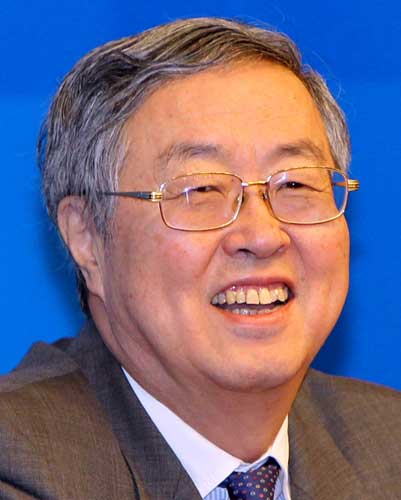


Zhou Xiaochuan
"We will continue to adopt a stable monetary policy," Zhou said. "We will focus on maintaining healthy and stable domestic growth and shifting to a new growth pattern against the backdrop of the new normal of the economy."
Economists have expected the monetary authorities to further cut interest rates and lower banks' reserve requirement ratio to offset the downward pressure. But the benchmark interest rates have remained unchanged since October.
Zhou said the quality of China's growth has been improving. Consumption growth contributed 66.4 percent of GDP growth last year, while energy use per unit of GDP dropped by 5.6 percent, showing positive signs of the shift of growth pattern to a consumption-driven model with higher efficiency. He added that China opposed using currency depreciation to make its exports more competitive.
"There is no basis for persistent yuan devaluation," Zhou said.
He also said the recent fluctuations in the yuan's exchange rate had reflected well the country's managed floating exchange rate regime, which is based on market supply and demand with reference to a currency basket. The US dollar remained dominant and had the largest weight in the basket, he said.
Zhou said that he had noticed concerns over the country's declining foreign reserves and capital outflows in recent months. But the decline was normal and consistent with the ongoing economic restructuring that was aimed at achieving a more balanced growth model, he said.
China still has the world's largest foreign exchange reserve, but it dropped to $3.33 trillion by the end of December — the lowest level since late 2011 and $110 billion less than a month ago, according to the central bank.
Zhou said that while the proper level of reserves needed to be further discussed, China is able to cope with possible challenges. "Currently, there's nothing to worry about."
Li Daokui, an economics professor at Tsinghua University and a former member of the central bank's monetary policy committee, was cited by Chinese-language media as saying that foreign reserves this year should not be lower than $3 trillion to stabilize the exchange rate of the yuan.
 |
 Engineer troop builds bridge in real combat conditions
Engineer troop builds bridge in real combat conditions You can urinate in public in Chongqing
You can urinate in public in Chongqing Rice terrace scenery in southwest China's Yunnan
Rice terrace scenery in southwest China's Yunnan 2016 Miss Chinatown USA pageant held in San Francisco
2016 Miss Chinatown USA pageant held in San Francisco Ancient pagodas across China
Ancient pagodas across China Wedding dress show up in the air
Wedding dress show up in the air Candidates perform in 2nd examination at Beijing Film Academy
Candidates perform in 2nd examination at Beijing Film Academy Russian photographer brings fairytales to life
Russian photographer brings fairytales to life Chinese beauties, foreign models meet in Chengdu
Chinese beauties, foreign models meet in Chengdu Top 20 hottest women in the world in 2014
Top 20 hottest women in the world in 2014 Top 10 hardest languages to learn
Top 10 hardest languages to learn 10 Chinese female stars with most beautiful faces
10 Chinese female stars with most beautiful faces China’s Top 10 Unique Bridges, Highways and Roads
China’s Top 10 Unique Bridges, Highways and Roads Harsher sanctions on NK are inevitable
Harsher sanctions on NK are inevitable Under Pope Francis and President Xi, hopes rise for a thaw in ties
Under Pope Francis and President Xi, hopes rise for a thaw in ties Why top students from African nations are flocking to Chinese vocational schools
Why top students from African nations are flocking to Chinese vocational schools After recent discovery ‘predicted’ by amateur, demands spread online for scientist to apologize
After recent discovery ‘predicted’ by amateur, demands spread online for scientist to apologizeDay|Week